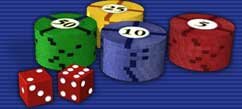Featured Casino
Sun Palace Casino


Blackjack Strategies
Visit Las Vegas USA Casino

Play Online Blackjack, Poker, Slots and many other online casino games!
Blackjack Articles
Featured Casinos
Vegas Casino Online
Sun Palace Casino
Slots Plus .com
Search articles online
General Gambling Articles
Best BlackJack Game
How Big To Bet
D'Alembert System
Summary on D'Alembert System

Play Blackjack,
Free Card Games
and more at
Vegas Online Casino
How Big To Bet
D'Alembert System
Summary on D'Alembert System

Play Blackjack,
Free Card Games
and more at
Vegas Online Casino
Gambling Links
Betting in Blackjack
Dealing blackjack is more boring than playing blackjack. The dealer's actions are cut and dried. A set of rules fixed by the casino decides whether the dealer takes an additional card. The dealer does not try to beat you; rather the dealer must play the hand according to the established and publicly proclaimed rules. It makes no difference to the honest dealer whether your cards are face up or face down. The honest dealer has no influence over the outcome of your hand. The greedy dealer roots for you in expectation of a toke if you win and in hope of a toke even if you lose.
You make choices all the time. Casino rules limit your options, but at least you can make decisions that affect the outcome of your hand. Sometimes two players firmly disagree on how to play a particular hand. Most of the time when you have a choice, one alternative is superior to all others. Sometimes the correct choice is obvious, but at other times the choice that you know to be correct looks stupid to anyone watching you.
The typical blackjack game goes something like this. You approach the table and notice five to seven little circles or other symbols that look like place markers. Actually they are locations for sacrificial offerings. You put a bet on the nearest little symbol and say a prayer or some such. The blackjack dealer shuffles the cards with lightning speed and an annoyed expression and sets the pack in front of you. You cut the cards and pray again. The dealer picks up the cards and places them in a box called a shoe. Or, if one or two decks are used: With a quick motion called burning a card, the dealer removes the top card and places it face up on the bottom of the pack or face down in the discard tray. The dealer gives one card face down to each player, one card face up to the dealer, a second card face down to each player, and a second card face down to the dealer. Variations exist; for example, some casinos deal all the players' cards face up.
Aces count either one or eleven. Face cards count ten. All other cards count their face amounts. A two-card combination of an ace and a 10 (meaning 10 or face card) is known as a "natural" or a "blackjack." If you have a natural you turn both cards face up and smile. The dealer with an ace or 10 up may check the hole card to see if the hand is a natural. With any other upcard, the honest dealer has no reason to look at the hole card. A dealer with a natural turns both cards face up. If the dealer has a natural and you do not, you lose. If you have a natural and the dealer does not, you happily win one and a half times your bet. If both you and the dealer have naturals, no money changes hands.
Insurance
Most casinos offer "insurance," a side bet that you may make when the dealer shows an ace. A dealer showing any other card does not offer insurance. Some casinos never offer insurance, ace or no ace. The insurance bet is almost always limited to half the original bet.
If you wish to take insurance, place a new bet in front of your original bet. The dealer with a natural (i.e. a 10 in the hole) pays two to one on the insurance bet. If the dealer does not have a natural, you lose your insurance bet. If both you and the dealer have naturals, the insurance bet still wins two to one. If the dealer has a natural while you do not, the win on the insurance bet equals the loss on the original hand and no money changes hands; hence the "insurance" tag.
Most of the time you will not have a natural and the dealer will not have a natural. Then you must select one of several options. The order in which you will consider them is: surrender, split a pair, double down, hit or stand. Not all options are available in all casinos. In any casino, however, you may have to make several consecutive decisions.
Surrender
A few casinos offer "surrender," and generally only on your first two cards — seldom after hitting or splitting a pair. Early surrender is surrender that is allowed before the dealer checks for a natural. Late surrender is when you must wait to surrender until after the dealer checks for a natural. If the dealer does not check the hole card, and acknowledges your desire to surrender by putting a tiddly-wink or some such on your cards, and picks up your whole bet in the event of a natural, you are playing against late surrender. Late surrender is more common, but early surrender is more profitable for the player.
You surrender by saying "Surrender" or "Take them; I do not want them!" or some such expression of hopelessness. The dealer then picks up your cards and half of your bet. You keep the other half of your bet, and sit back to watch while the other players and the dealer finish their hands.
Splitting a Pair
You can split any pair. A pair is two cards with the same point value, such as ace-ace, 2-2, etc. Generally any 10-10 is a pair and may be split; e.g., you may split a jack and a king at most casinos. "Splitting a pair" is accomplished by turning both cards face up and placing an additional bet equal to the first bet by the two turned-up cards. You then have two hands with a bet on each.
If you split ace-ace, each will receive one — and only one — additional card on each ace. In other words, at most casinos you cannot get more than two additional cards after splitting aces. There are exceptions; the occasional casino allows resplit of aces or multiple hits to split aces.
If you split any other pair — that is, any pair except aces — you ask for additional cards on the first hand until satisfied with it, then move on to the second hand and ask for additional cards for that one until satisfied. If the first additional card to either of the split pair is a third of the kind, it may be resplit to make a third hand in most casinos. Resplitting to make four hands is generally allowed, but not resplitting to make five or more hands.

The typical blackjack game goes something like this. You approach the table and notice five to seven little circles or other symbols that look like place markers. Actually they are locations for sacrificial offerings. You put a bet on the nearest little symbol and say a prayer or some such. The blackjack dealer shuffles the cards with lightning speed and an annoyed expression and sets the pack in front of you. You cut the cards and pray again. The dealer picks up the cards and places them in a box called a shoe. Or, if one or two decks are used: With a quick motion called burning a card, the dealer removes the top card and places it face up on the bottom of the pack or face down in the discard tray. The dealer gives one card face down to each player, one card face up to the dealer, a second card face down to each player, and a second card face down to the dealer. Variations exist; for example, some casinos deal all the players' cards face up.
Aces count either one or eleven. Face cards count ten. All other cards count their face amounts. A two-card combination of an ace and a 10 (meaning 10 or face card) is known as a "natural" or a "blackjack." If you have a natural you turn both cards face up and smile. The dealer with an ace or 10 up may check the hole card to see if the hand is a natural. With any other upcard, the honest dealer has no reason to look at the hole card. A dealer with a natural turns both cards face up. If the dealer has a natural and you do not, you lose. If you have a natural and the dealer does not, you happily win one and a half times your bet. If both you and the dealer have naturals, no money changes hands.
Insurance
Most casinos offer "insurance," a side bet that you may make when the dealer shows an ace. A dealer showing any other card does not offer insurance. Some casinos never offer insurance, ace or no ace. The insurance bet is almost always limited to half the original bet.
If you wish to take insurance, place a new bet in front of your original bet. The dealer with a natural (i.e. a 10 in the hole) pays two to one on the insurance bet. If the dealer does not have a natural, you lose your insurance bet. If both you and the dealer have naturals, the insurance bet still wins two to one. If the dealer has a natural while you do not, the win on the insurance bet equals the loss on the original hand and no money changes hands; hence the "insurance" tag.
Most of the time you will not have a natural and the dealer will not have a natural. Then you must select one of several options. The order in which you will consider them is: surrender, split a pair, double down, hit or stand. Not all options are available in all casinos. In any casino, however, you may have to make several consecutive decisions.
Surrender
A few casinos offer "surrender," and generally only on your first two cards — seldom after hitting or splitting a pair. Early surrender is surrender that is allowed before the dealer checks for a natural. Late surrender is when you must wait to surrender until after the dealer checks for a natural. If the dealer does not check the hole card, and acknowledges your desire to surrender by putting a tiddly-wink or some such on your cards, and picks up your whole bet in the event of a natural, you are playing against late surrender. Late surrender is more common, but early surrender is more profitable for the player.
You surrender by saying "Surrender" or "Take them; I do not want them!" or some such expression of hopelessness. The dealer then picks up your cards and half of your bet. You keep the other half of your bet, and sit back to watch while the other players and the dealer finish their hands.
Splitting a Pair
You can split any pair. A pair is two cards with the same point value, such as ace-ace, 2-2, etc. Generally any 10-10 is a pair and may be split; e.g., you may split a jack and a king at most casinos. "Splitting a pair" is accomplished by turning both cards face up and placing an additional bet equal to the first bet by the two turned-up cards. You then have two hands with a bet on each.
If you split ace-ace, each will receive one — and only one — additional card on each ace. In other words, at most casinos you cannot get more than two additional cards after splitting aces. There are exceptions; the occasional casino allows resplit of aces or multiple hits to split aces.
If you split any other pair — that is, any pair except aces — you ask for additional cards on the first hand until satisfied with it, then move on to the second hand and ask for additional cards for that one until satisfied. If the first additional card to either of the split pair is a third of the kind, it may be resplit to make a third hand in most casinos. Resplitting to make four hands is generally allowed, but not resplitting to make five or more hands.

Copyright © 2006 Online Blackjack News. This material may not be published, broadcast, rewritten, or redistributed.



